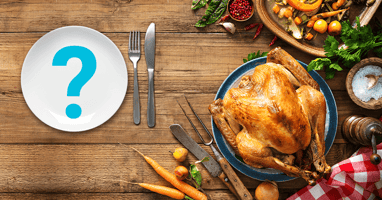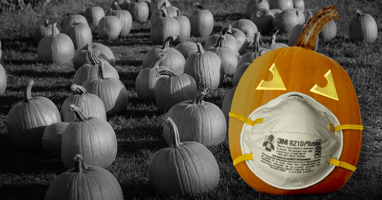The fall season is here with its many events and holidays to celebrate. Among those holidays is...
Life in the Time of COVID-19: Celebrating Independence from the Virus by the 4th?

Last year, due to the risks associated with contracting COVID-19, many Americans chose to forgo many of their traditional Independence Day celebrations: barbecues, parades, parties, and fireworks. However, with the rollout of COVID-19 vaccines and approximately 50% of all Americans already vaccinated with at least one dose, we may see significant changes in what people will choose to do this year to celebrate Independence Day.
Many experts agree with the notion that life after COVID-19 will never be the same, as we will likely have to take permanent precautionary measures to protect against the virus. However, President Joe Biden has recently offered a more optimistic view by positing that July 4th is “…our target date to get life in America closer to normal and to begin to celebrate our Independence from the virus together with our friends and loved ones.” How optimistic do Americans feel about this statement? More importantly, compared to last year, how will this optimism translate into Americans’ desire to celebrate Independence Day, if at all, this year? Given the significance of this holiday, how important is it for them to break out of social isolation, and what are the reasons driving their decisions?
IntelliSurvey conducted an online survey of 914 adults in the U.S to find the answers to these questions.
Got optimism?
With nearly half of the US population partially or fully vaccinated, we set out to measure levels of optimism toward President Biden’s statement on getting life in America closer to normal by Independence Day 2021. We found that the majority of respondents (64%) feel optimistic about Biden’s statement. But how will this translate into people’s choice to celebrate or not celebrate Independence Day this year?
Independence Day Celebrations 2020 vs. 2021
When asked how, if at all, they celebrated Independence Day in 2020, 34% of respondents indicated that they did not celebrate it and just stayed home. Interestingly, only 5% indicated having a virtual get-together with others via an online meeting tool (e.g., Zoom, Skype). Among those who did celebrate Independence Day 2020, 25% indicated that they had a cookout/barbecue at home with their family only, 21% said they did so with both family and friends, and 14% reported that they watched fireworks and actually joined in a community celebration.
When asked how, if at all, they intend to celebrate Independence Day in 2021, 18% reported that they do not plan on celebrating and will be staying home. Virtual get-togethers stayed relatively constant compared to last year, with 4% indicating that they plan on joining one of those. Among those who will celebrate Independence Day this year, 34% indicated that they will be having a cookout/barbecue with family and friends, while 21% will do so with family only, and 22% will watch fireworks and join a community celebration.
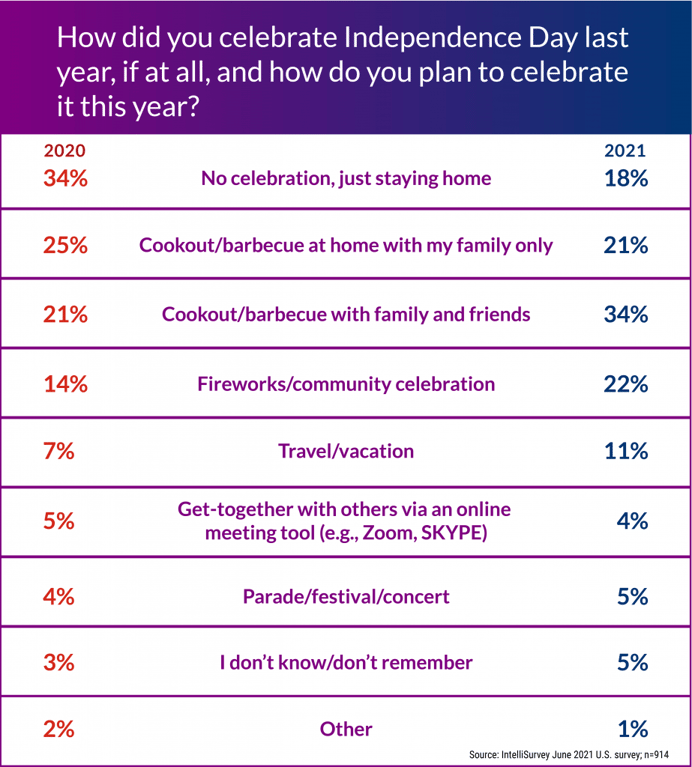
To celebrate or not to celebrate Independence Day 2021?
In a similar vein, we set out to understand the reasons behind people’s choice to celebrate Independence Day this year by attending a cookout with friends, a parade/festival/concert, a community celebration/fireworks, or traveling. Not surprisingly, we found that the desire to celebrate was driven by vaccination status. Specifically, 71% of those who have already been fully vaccinated report that they are ready for life to go back to normal. This represents a significant difference from those who have not been vaccinated, with only 55% in this group indicating that they’re ready for a return to normalcy. In addition, 13% of fully vaccinated people mention health reasons to justify their choice to celebrate, compared to only 4% of those who have not been vaccinated.
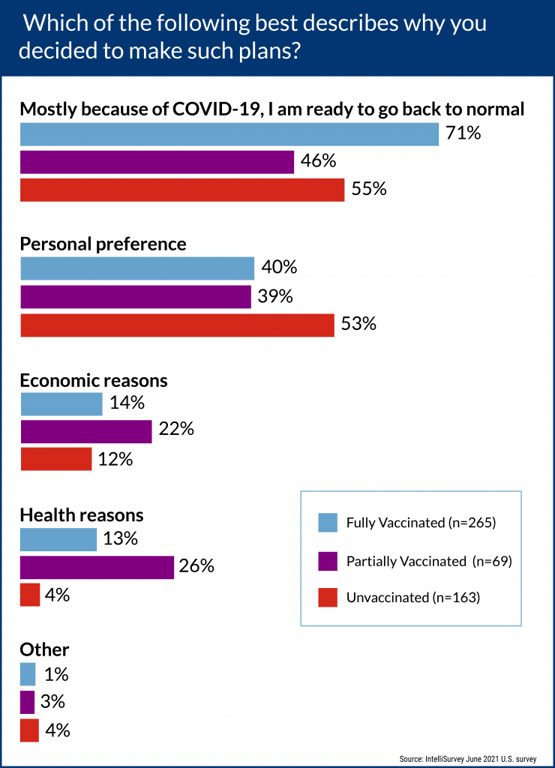
Among those who indicate that they will stay home with family, join a get-together with friends online, or not celebrate Independence Day at all, the primary reason for their choice is that given COVID-19, it is too soon to try and go back to normal (54%). The second most common reason was personal preference (44%).
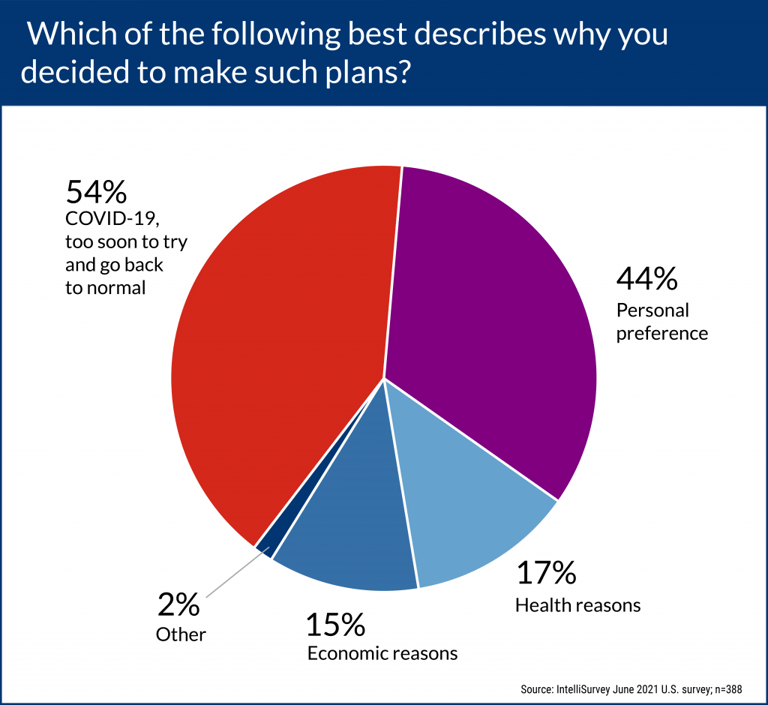
The importance of celebrating Independence Day in 2021
In light of the significance of Independence Day and people’s perceptions of freedom during an evolving worldwide pandemic, we wanted to understand the extent to which people feel it is important to celebrate Independence Day and venture out of social isolation.
Interestingly, we found that 37% of respondents indicated that it is much more important for them to break out of social isolation and celebrate this year. When asked why, the most common reasons were feelings of isolation and wanting human connection (30%), end of lockdown (i.e., being able to do things they couldn’t last year) (22%), and vaccination (16%).
Further, 32% indicated that it is just as important for them to celebrate than it was last year. Among this group, the top three reasons were feelings of isolation and wanting human connection (38%), family tradition (25%), and patriotism (10%).
Finally, those who indicated that it is less important for them to celebrate (14%) or not important at all (18%) primarily mentioned concerns related to COVID-19 (61%) and lack of personal meaning (38%), respectively.
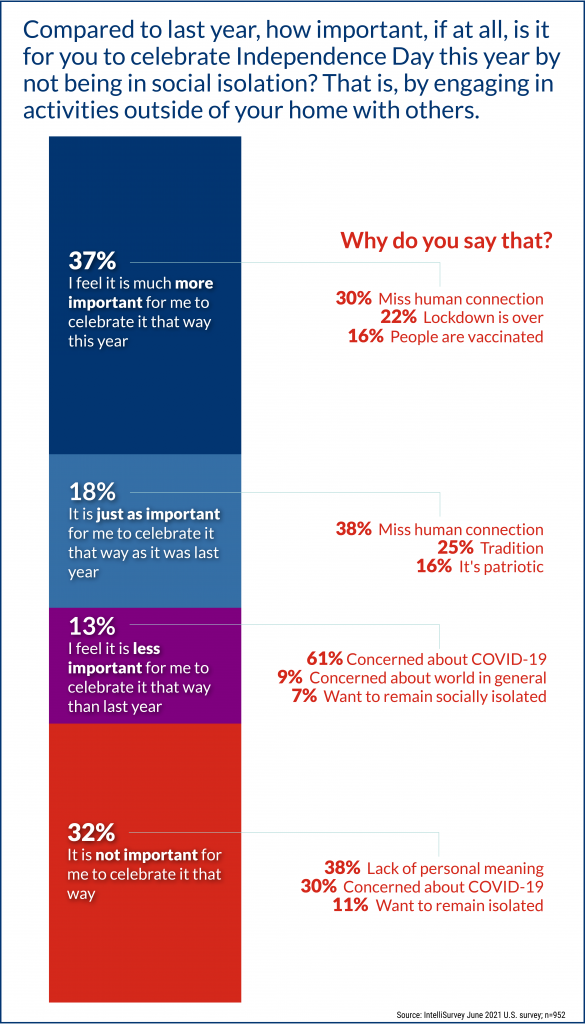
These findings suggest that although some Americans may feel optimistic and more motivated to venture out of social isolation for Independence Day this year, they are remaining relatively cautious in their choices. While many more people plan to reconnect and spend time with others at cookouts, barbecues, and other traditional celebrations, particularly those who have been fully vaccinated, there is still a sense of concern and precaution related to the spread of COVID-19. Given the emergence of more contagious and deadly variants of the virus and the uncertainty as to how effective and for how long current vaccines will prevent vaccinated people from getting or spreading the variants, it is understandable that some people feel that it is better to be safe than sorry.
